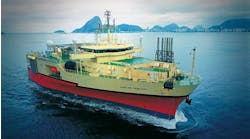Offshore staff
PARIS – Total and Google Cloud have agreed to jointly develop artificial intelligence (AI) solutions for subsurface data analysis for oil and gas exploration and production.
The focus will be on AI programs that can interpret subsurface images, in particular from seismic studies (using Computer Vision technology), and others to automate analysis of technical documents (using Natural Language Processing technology).
Total expects these programs to help its geologists, geophysicists, reservoir and geo-information engineers explore and evaluate oil and gas fields faster and more effectively.
The company’s geoscientists will work alongside Google Cloud’s machine learning specialists within a team based at Google Cloud’s Advanced Solutions Lab in California.
“Total is convinced that applying artificial intelligence in the oil and gas industry is a promising avenue to be explored for optimizing our performance, particularly in subsurface data interpretation,” said Marie-Noëlle Semeria, svp, Group CTO at Total.
“This builds on the strategy being developed at Total, where AI is already used, for example, in predictive maintenance at facilities.”
“Our ambition is to give our geoscience engineers an AI personal assistant in the next few years that will free them up to focus on high value-added tasks,” added Kevin McLachlan, the company’s svp Exploration for Exploration & Production.
Total started applying artificial intelligence to characterize oil and gas fields using machine-learning algorithms in the 1990s.
In 2013, Total it used machine-learning algorithms to implement predictive maintenance for turbines, pumps and compressors at its industrial facilities, which resulted in savings of several hundred million dollars.
Today, the company is assessing machine learning and deep learning applications such as production profile forecasting, automated analysis of satellite images, and analysis of rock sample images.
04/25/2018


